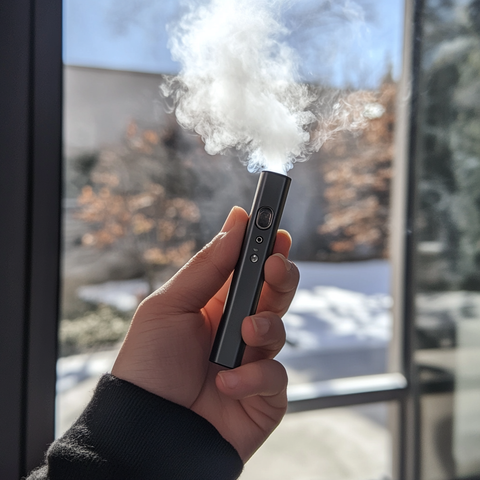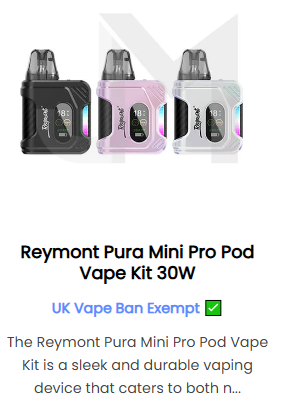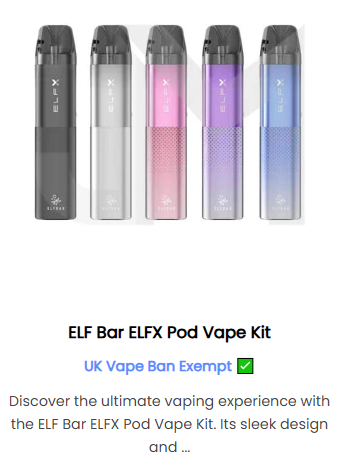How the disposable vape ban will affect your business? Click Here to Check out our FAQ for clear insights and expert advice!
The UK’s vape ban on single-use disposable vapes has entered its active phase, with significant milestones and compliance deadlines approaching for retailers. This ban, scheduled to fully take effect on June 1, 2025, addresses critical issues surrounding disposable vapes, from environmental harm to the safety and health risks associated with youth access. The government, supported by officials like Andrew Gwynne the Minister for Public Health and Prevention, has highlighted the importance of this ban as part of a broader public health initiative.
Retailers now face the challenge of transitioning away from banned products and managing inventory accordingly. This guide will outline strategies to help retailers not only comply with the ban but also maintain market resilience. We’ll explore what this ban specifically covers, address common questions, and provide actionable steps to support a smooth transition. As we go deeper into the details, let’s start by understanding the exact scope and intent behind this legislation.
Understanding the Vape Ban in the UK
The UK’s decision to ban disposable vapes aligns with increasing concern over their environmental and social impacts. As of June 1, 2025, it will be illegal to sell or distribute any single-use vape that does not meet rechargeability or refillability standards. Notably, rechargeable vapes and prefilled pod systems (such as popular pod devices like Big Puff) remain unaffected by this ban, providing legal alternatives for retailers and consumers alike.
This legislation arose from combined efforts by the UK government and health advocacy groups to reduce the risks associated with these disposable devices. Health officials, including Steve Barclay, have been vocal about the need for reform, highlighting the dangers of lithium-ion batteries used in these products, which often end up in landfills, contaminating soil and groundwater. Additionally, discarded vapes have created an eyesore in urban areas, with devices littering public spaces and causing harm to local wildlife.
Another concern is the influence of disposable vapes on youth culture. Research indicates that the vibrant colors and affordable price of these products have unintentionally attracted a younger audience, raising public health alarms. Youth vaping rates have surged, making accessibility a critical issue. Officials have emphasized the need for this ban as a protective measure against underage nicotine consumption.
This ban aims to address these issues comprehensively, setting a regulatory precedent that could influence other countries facing similar challenges. By preparing now, retailers can not only comply with the new regulations but also stay ahead in an industry that values responsible practices.
(For further details on the products included, view the UK Government’s announcement here.)
Reasons Behind the Ban
The disposable vape ban addresses three primary concerns: public health risks, environmental harm, and underage access to vaping products. Each of these concerns has been a focal point of government regulation and advocacy in the vaping industry.
1. Protecting Public Health
Disposable vapes pose numerous health risks, particularly to younger users who may not fully understand the implications of nicotine consumption. The nicotine content in these devices is often high, which can lead to addiction and other health problems if misused. Public health officials have raised alarms over cases of poisoning from accidental ingestion of vape liquids, especially among minors. By limiting access to disposable vapes, the government aims to mitigate these risks.
Additionally, the rise in vaping among adolescents has spurred government action, as early exposure to nicotine can lead to long-term health issues. The Minister for Public Health and Prevention Andrew Gwynne has stated that the packaging and accessibility of these vapes contribute to a trend that threatens the well-being of young people. This ban provides a safeguard, reducing the visibility and accessibility of single-use vapes in public spaces.
2. Reducing Environmental Waste
The environmental impact of disposable vapes has become a pressing issue. These products are designed for one-time use, making them highly wasteful and difficult to recycle. The components of disposable vapes, including plastic casings and lithium-ion batteries, often end up in landfills where they release harmful chemicals into the soil and water systems. Many of these discarded items find their way onto streets and into public parks, negatively impacting urban aesthetics and presenting hazards to animals who may come into contact with them.
The UK government’s approach to this ban aligns with broader environmental goals to reduce waste and encourage sustainability in product design. By restricting disposables, the government hopes to lower the number of these items entering the waste stream and to set a precedent for environmentally friendly product policies.The Environmental Protection (Single-use Vapes) (England) Regulations 2024 provides an informative overview of the environmental concerns around disposable vapes here.
3. Limiting Underage Access to Vaping
One of the main drivers behind the vape ban is to reduce the appeal of vaping among youth. With their colorful designs and often fruity flavors, disposable vapes have been found to attract younger audiences, inadvertently promoting vaping to those underage. By banning single-use vapes, the government aims to reduce the chances of children and teens gaining access to these products, thereby protecting them from the health risks associated with early nicotine exposure.
Efforts to curb youth vaping also involve supporting retailers in enforcing age-verification protocols. The hope is that by removing disposables, which are typically more accessible and affordable, underage vaping will decline as youth lose interest or access to the products.

The Ban’s Expected Impact on the UK Vaping Industry
The disposable vape ban will create a significant shift in the UK vaping industry. As retailers prepare for these changes, it’s essential to consider the various ways this ban will affect product offerings, market demand, and compliance strategies.
1. Transition from Disposable to Sustainable Options
The ban necessitates a move away from single-use vapes, pushing retailers to focus on products that comply with the new regulations. This shift provides an opportunity to promote refillable and rechargeable vape kits that offer a more sustainable, long-term alternative. These options reduce waste and appeal to environmentally conscious consumers, helping retailers maintain sales while aligning with government guidelines.
2. Increased Demand for Alternative Devices
As single-use vapes are phased out, demand is expected to rise for pod systems and rechargeable devices. Retailers may need to adjust inventory to accommodate these alternatives, ensuring they have a variety of legal options available for customers. This transition offers retailers a chance to educate customers on the benefits of sustainable vaping options, emphasizing long-term value over the convenience of disposables.
3. Compliance and Legal Considerations
The ban introduces stricter compliance requirements for retailers, necessitating close attention to product sourcing and sales practices. Retailers must stay updated on permissible product categories, maintain transparent communication with customers, and implement age-verification protocols rigorously to prevent underage sales. Building strong relationships with reputable suppliers is key to ensuring product compliance and avoiding illegal sales.
By addressing these impacts proactively, retailers can adapt to the changing landscape while remaining competitive in the industry.
Preparing for the Ban as a Retailer
Preparing for the disposable vape ban in the UK requires a strategic approach that covers compliance, inventory adjustments, and customer communications. Retailers who take proactive steps to align with the ban’s requirements will be better equipped to sustain their business and retain customer trust.
1. Ensuring Compliance with Regulations
Staying compliant means understanding exactly what’s banned and what’s still allowed. Only single-use, non-rechargeable vapes are prohibited under the ban; refillable and rechargeable devices, including popular pod-based systems, remain legal. Staff training is essential for preventing accidental sales of prohibited items and ensuring that employees understand the consequences of non-compliance. Detailed signage in-store and online can clarify product distinctions for customers, reducing potential misunderstandings.
Retailers should also implement robust age-verification protocols to prevent underage sales. With a focus on compliance, retailers can safeguard their reputations and avoid penalties. For specific regulatory updates and guidance, refer to the UK Government’s official site here.
2. Adjusting Inventory to Focus on Sustainable Options
Inventory management is critical in preparing for the ban. Retailers need to phase out disposable products by June 2025, focusing instead on refillable vapes, pod-based systems, and rechargeable devices. These options provide a compliant alternative that aligns with the government’s sustainability goals, offering customers a longer-lasting, environmentally friendly choice.
A proactive approach to inventory means identifying top-selling disposable alternatives and discussing supply chain logistics with vendors early on. Additionally, brands may consider sourcing eco-friendly packaging or devices made from sustainable materials, which can appeal to environmentally conscious consumers.
3. Educating Customers on Legal, Sustainable Alternatives
Transitioning away from disposables presents an opportunity to engage and educate customers about sustainable vaping options. Retailers can explain the benefits of refillable and rechargeable devices, such as long-term cost savings and reduced environmental impact. Creating in-store displays, online resources, or informative handouts can guide customers toward understanding their options and dispel any confusion about which products are legal.
Effective communication fosters trust and allows customers to make informed choices, making the transition easier for both the retailer and the consumer.
4. Emphasizing Compliance in Marketing and Brand Messaging
As the disposable vape ban is fully enforced, transparency in marketing and communications will be essential. Avoid advertising disposable products to prevent compliance issues, and instead, focus on promoting refillable systems and other sustainable alternatives. By adjusting brand messaging to emphasize compliance and responsibility, retailers can align with public sentiment, supporting a cleaner, safer environment and youth protection.
What Qualifies as a “Single-Use” Vape? A Simplified Explanation
In recent regulations, a vape is classified as “single-use” if it’s designed for limited use and then disposal, rather than for repeated use. However, understanding what qualifies as “single-use” can be tricky due to the criteria involved. Here’s a simple breakdown to help you understand the key points, with examples along the way.
Key Criteria for Single-Use Vapes
A vape is considered single-use if it meets any one of these three criteria:
- It’s not refillable (you cannot add new e-liquid or pods).
- It’s not rechargeable (you cannot recharge the battery).
- It’s both not refillable and not rechargeable (a completely closed system).
The vape only needs to meet one of these conditions to be classified as single-use, meaning if it’s not refillable, or not rechargeable, or both, it’s considered single-use.
Let’s go through these criteria in more detail.
What Does “Not Refillable” Mean?
According to the regulation, a vape is not refillable unless it’s designed to allow the user to easily replace or refill the container (the part that holds the e-liquid). Here’s what that looks like:
- Example of a Refillable Vape: A vape with a refillable tank or pod system that lets you add new e-liquid when it’s empty. This type of device would not be considered single-use (as long as it’s rechargeable too).
- Example of a Non-Refillable Vape: A disposable vape pen that comes pre-filled with e-liquid and cannot be refilled once empty. This is considered single-use under the regulation.
For the device to be refillable, it must allow the container or pod to be separately available and replaceable by the user during normal use.
What Does “Not Rechargeable” Mean?
Similarly, a vape is not rechargeable if it doesn’t allow the user to recharge the battery. To be classified as rechargeable, it should meet one of the following criteria:
- It must have a battery that can be recharged.
- It must have a coil that can be replaced or is accessible to the user without needing to replace the entire device.
For instance:
- Example of a Rechargeable Vape: A vape pen that has a rechargeable battery, even if it comes with a single-use pod. As long as the battery can be charged, it doesn’t qualify as single-use (unless it also isn’t refillable).
- Example of a Non-Rechargeable Vape: A fully disposable vape pen where, once the battery is depleted, the entire device must be thrown away. This is considered single-use.
Putting It All Together: Examples of Single-Use and Non-Single-Use Vapes
Here are some practical examples to help make this clearer.
Example 1: Rechargeable but Not Refillable
- Device: A vape with a rechargeable battery but a sealed pod that cannot be refilled.
- Classification: Single-use. Even though it’s rechargeable, it fails the “refillable” criterion, so it’s classified as single-use.
Example Products:
Example 2: Refillable but Not Rechargeable
- Device: A vape with a replaceable e-liquid tank but a non-rechargeable battery.
- Classification: Single-use. Even though it’s refillable, it fails the “rechargeable” criterion, so it’s classified as single-use.
Example 3: Not Refillable and Not Rechargeable
- Device: A typical disposable vape that comes pre-filled and has a non-rechargeable battery.
- Classification: Single-use. This device fails both criteria (it’s neither refillable nor rechargeable), so it’s classified as single-use.
Example Products:
Example 4: Refillable and Rechargeable
- Device: A vape with a replaceable pod/tank and a rechargeable battery.
- Classification: Not single-use. This device meets both criteria for reusability (refillable and rechargeable), so it’s not considered single-use.
Example Products:
Summary
To determine if a vape is single-use under these regulations, ask:
- Is it refillable? If no, it’s single-use.
- Is it rechargeable? If no, it’s single-use.
- Does it fail both conditions? Then, it’s definitely single-use.
Any vape that fails at least one of these criteria (not refillable or not rechargeable) is classified as single-use. This approach ensures that any vape device designed with limited functionality falls under the single-use classification, even if it has one reusable feature.
Alternative Product Options and Shifting Customer Preferences
The ban on disposable vapes encourages a shift in consumer habits, with many customers now considering sustainable options. Retailers can facilitate this transition by highlighting alternative products that comply with regulations and appeal to evolving preferences.
1. Promoting Refillable and Rechargeable Devices
Refillable vape devices are an eco-friendly and cost-effective alternative to disposable ones. They typically last longer, providing better value for consumers willing to invest in reusable options. Retailers can set up displays or demonstrations to show customers how to use these devices, highlighting their environmental benefits and cost savings. Many pod systems and rechargeable devices come in stylish designs, offering a similar experience to disposables without the environmental impact. Marketing these products as part of a “sustainable collection” can attract eco-conscious customers.
Large puff devices, such as 4-in-1 pod kits like the SKE Crystal 4in1, Elf Bar 4in1 which represent a new generation of refillable devices that mimic the convenience of disposables while offering sustainability benefits. These devices combine the ease of use of disposables with the eco-friendliness of refillable systems, showing that disposable-style vapes are evolving rather than disappearing.
Refillable pod kits, such as the OXVA Xlim Pro pod kit, offer another sustainable alternative. These devices provide a balance between simplicity and customization, allowing users to enjoy a wide range of e-liquid flavors while minimizing waste.
For those transitioning from disposables to refillable systems, nicotine salts are an excellent e-liquid option. Brands like Elfliq, Bar Series offering nicotine salt e-liquids that provide a smooth throat hit and quick nicotine absorption, similar to the experience of disposable vapes.
Legal Disposable Vapes – How to Identify Legal Disposables
At JM Wholesale, we prioritize compliance with the evolving vaping regulations to ensure you can confidently stock our “Legal Disposable Vapes” collection as the UK vape ban approaches. To recognize legal disposables, check for features like a maximum pod capacity of 2ml, nicotine strength capped at 20mg/ml (2%), and the added benefits of USB charging and refillable pods. Our products are clearly labeled with “UK Vape Ban Exempt” all compliant with MHRA standards. As a UK Vape Ban Exempt retailer, we guarantee that every disposable vape we offer meets current regulations, allowing you to serve your customers with high-quality, legal options at competitive wholesale prices. With our rechargeable and refillable devices, you can provide a sustainable and cost-effective vaping solution that your customers will appreciate.
Check a wide selection of UK Vape Ban Exempt Products Here.


2. Encouraging Customers to Adopt Sustainable Habits
In addition to introducing new products, retailers can encourage customers to adopt sustainable habits, such as responsibly disposing of vaping materials. By providing informational materials or links to disposal programs, retailers can guide customers toward environmentally friendly behaviors, aligning with the objectives of the ban.
Some retailers may even consider offering incentives for customers who transition to refillable devices, such as discounts or loyalty programs, to encourage sustainable purchasing.
3. Educating on the Benefits of Reduced Waste and Sustainability
Sustainable alternatives, particularly those with biodegradable or recyclable components, reduce overall waste and have less of a negative impact on the environment. Informing customers of these benefits, along with tips on maintaining and caring for their devices, can help solidify this positive change in buying habits1. This approach also helps differentiate a retailer’s offerings, positioning the business as responsible and forward-thinking.Community and Environmental Impact
The ban on disposable vapes could yield significant benefits for communities across the UK, promoting cleaner public spaces and addressing health concerns associated with nicotine products.
4. Introducing Nicotine Pouches as an Alternative
Nicotine pouches offer another alternative solution in light of the disposable vape ban. These tobacco-free, smokeless products provide nicotine satisfaction without the need for any device or battery. They’re discreet, easy to use, and produce no waste beyond the small pouch itself. Retailers can position nicotine pouches as a complementary product for vapers looking for nicotine delivery options in situations where vaping might not be possible or convenient.
Strategies to Avoid Black Market Trade
The disposable vape ban raises concerns about the rise of a black market for disposable vapes, as some customers may seek illegal sources for products they’re accustomed to. Retailers need to stay vigilant and informed to avoid any potential associations with black-market activities.
1. Identifying and Avoiding Black Market Sources
Working only with trusted suppliers is crucial in ensuring that inventory remains compliant. Retailers should verify the legality of their products and maintain documentation to demonstrate the source and compliance of their stock. By establishing strong relationships with reputable distributors, retailers can minimize the risk of inadvertently selling banned products.
Regular audits and staff training on identifying unauthorized products can further protect businesses from inadvertently dealing in black-market items. Products obtained through unknown or unverifiable channels should be avoided, as they carry both legal risks and potential harm to consumers.
2. Educating Customers on the Risks of Black-Market Products
Many customers may not be aware of the risks associated with black-market vape products, including the potential health hazards of unregulated devices and nicotine solutions. Educating customers on the potential dangers, such as improperly disposed lithium-ion batteries, can help discourage them from seeking alternatives outside of legal channels. Providing this information reinforces the benefits of purchasing compliant products and supports customers in making safer choices.
3. Engaging with Local Law Enforcement and Community Initiatives
Retailers can collaborate with local authorities or participate in community initiatives focused on reducing black-market activities. Engaging with law enforcement not only helps keep communities safe but also demonstrates a commitment to public health and compliance. By reporting any suspicious activities or products, retailers can contribute to broader efforts to curb the distribution of illegal vapes.

Enforcement of the UK Disposable Vape Ban
The enforcement measures for the UK Disposable Vape Ban, as outlined in the Environmental Protection (Single-use Vapes) (England) Regulations 2024 link, provide local authorities and regulatory bodies with extensive powers to monitor and ensure compliance with the ban on single-use vapes. Here’s an overview of how these regulations will be enforced:
1. Compliance Notices and Stop Notices
- Compliance Notices: These require businesses to take specific actions to prevent ongoing or future offences related to single-use vape products. Failure to comply may lead to additional penalties or further enforcement actions.
- Stop Notices: Issued in cases where significant environmental harm or risk is present, stop notices can immediately halt activities such as the sale of single-use vapes. Non-compliance with a stop notice is considered a criminal offence.
2. Civil Sanctions
The regulations allow local authorities to impose several civil sanctions:
- Fixed Monetary Penalties: Fines that serve as immediate penalties for offences.
- Non-compliance Penalties: Additional fines imposed on businesses that fail to adhere to the requirements of a compliance notice or other mandated actions.
- Enforcement Undertakings: Businesses may enter an agreement to take corrective actions benefiting affected parties or the environment.
These measures, outlined in Part 3, Enforcement and Civil Sanctions of the Regulations, aim to hold businesses accountable and provide avenues for correcting non-compliant behaviour before escalating to harsher penalties.
3. Powers of Entry and Examination
Local authorities are granted the power to:
- Enter premises (excluding dwellings) to conduct inspections.
- Inspect documents and seize evidence related to single-use vape offences.
- Sample and test products suspected of non-compliance.
These powers are essential for regulatory bodies to verify compliance and prevent black-market activities.
4. Appeal Mechanisms
Businesses retain the right to appeal against enforcement actions, including compliance notices, fixed monetary penalties, and stop notices, via the First-tier Tribunal. Grounds for appeal may include factual inaccuracies, errors in law, or unreasonableness in enforcement decisions.
5. Cost Recovery for Enforcement Actions
To ensure efficient enforcement, regulators can issue Enforcement Cost Recovery Notices. These notices require businesses to cover expenses incurred during investigations and enforcement, such as legal or administrative costs. Retailers have the option to request a breakdown of these costs and can appeal if they believe the charges are excessive.
6. Publication of Enforcement Actions
In most cases, regulators are required to publish details of civil sanctions imposed. This transparency ensures that the public and industry are informed about non-compliant businesses, reinforcing accountability across the sector.
For full details of these enforcement provisions, including specific powers and penalties, refer to the Environmental Protection (Single-use Vapes) (England) Regulations 2024 here.
Community and Environmental Impact
The ban on disposable vapes could yield significant benefits for communities across the UK, promoting cleaner public spaces and addressing health concerns associated with nicotine products.
1. Reducing Litter and Environmental Damage
Disposable vapes have become a frequent sight in urban litter, often left in streets, parks, and natural areas. Removing these single-use products from circulation is expected to reduce this waste, fostering cleaner environments and improving the aesthetic quality of public spaces. The long-term benefits of reduced plastic and lithium waste are substantial, offering relief for city cleanup efforts and reducing harm to wildlife.
The government’s emphasis on eliminating waste aligns with broader environmental goals, supporting sustainable development and healthier ecosystems. More information on these initiatives can be found in the UK Government’s release here.
2. Limiting Youth Access and Protecting Vulnerable Populations
The UK’s youth population has been disproportionately affected by the prevalence of disposable vapes, as many of these devices were marketed with colorful packaging and flavors appealing to younger audiences. By removing disposables from the market, officials hope to make nicotine less accessible to underage individuals, safeguarding their health.
The ban also aligns with efforts to educate young people on the risks of vaping, with resources available to support parents and schools in discouraging underage vaping. Local authorities and public health organizations have been instrumental in raising awareness of the health implications of early nicotine use, ensuring communities are informed about the risks.

Conclusion
The disposable vape ban in the UK represents a decisive step towards a more sustainable and health-conscious future, addressing both environmental issues and youth protection. For retailers, this ban presents a challenge, yet also opens the door to aligning with government regulations while expanding their product offerings to include sustainable, compliant options.
Preparing for the ban involves several critical actions: aligning inventory with compliant products, focusing on refillable and rechargeable devices, and ensuring staff are well-informed on the specifics of the legislation. By prioritizing transparency, retailers can retain customer trust and educate their base on the benefits of sustainable alternatives, positioning themselves as leaders in the shift toward responsible vaping practices.
As the June 1, 2025, deadline approaches, retailers who take proactive measures will be best positioned to continue thriving within a compliant, regulated industry. By embracing sustainable alternatives and actively discouraging black-market associations, businesses can maintain customer loyalty and contribute to cleaner communities across the UK. This transition not only supports a safer environment but also reflects the shared responsibility to protect future generations from the risks associated with single-use nicotine products.
UK Disposable Vape Ban: Comprehensive FAQ for Retailers
- What is the UK Disposable Vape Ban?
The UK Disposable Vape Ban prohibits the sale, supply, and possession for supply of single-use, disposable vapes across England. The ban is part of a broader initiative to address environmental concerns, youth access, and public health risks associated with disposable vaping products.
- When do these new regulations take effect?
The ban will come into force on 1st June 2025, making it illegal to supply, offer for supply, or possess for supply any single-use vape.
- What qualifies as a “single-use vape” under these regulations?
A single-use vape is defined as a device that is neither refillable nor rechargeable. This includes any vape with a non-rechargeable battery or a non-refillable pod or cartridge.
- Are all types of single-use vapes affected by the ban?
Yes, any vape that meets the criteria for single-use, as defined in the regulations, will be subject to these restrictions. Only refillable and rechargeable vape devices remain legal, such as pod systems or other compliant alternatives.
- Why is this ban being implemented?
The ban is being introduced to:
- Protect Public Health: By reducing youth access to high-nicotine devices and discouraging early nicotine exposure.
- Reduce Environmental Waste: Disposable vapes contribute significant waste, with non-recyclable components and lithium batteries.
- Limit Youth Access: Single-use vapes often attract younger audiences due to their design and flavours, posing a risk of underage usage.
- What penalties could I face for non-compliance?
Non-compliance with the regulations can result in criminal and civil penalties. Criminal offences are punishable by fines or imprisonment, while civil sanctions include fixed monetary penalties, compliance notices, and stop notices. Appeals can be made through the First-tier Tribunal if necessary.
- What are the specific penalties for single-use vape offences?
- Summary Conviction Fines: For supplying or possessing banned products.
- Civil Penalties: Fixed fines and compliance or stop notices, especially for serious or ongoing offences.
- What is a “stop notice,” and when could it be issued?
A stop notice requires the immediate cessation of activities causing significant environmental harm or risk, including the sale of single-use vapes. Failure to comply is a criminal offence, and compliance must continue until a completion certificate is issued.
- What enforcement powers do local authorities have?
Local authorities have the right to:
- Enter business premises to investigate potential offences.
- Inspect records and seize relevant documents.
- Impose compliance and stop notices if violations are identified.
- What is a compliance notice?
A compliance notice requires the retailer to take specific actions to prevent future offences. Non-compliance with this notice could lead to additional penalties or enforcement measures.
- Are there defences available for non-compliance?
Retailers can argue due diligence if they took all reasonable steps to avoid the offence. Other defences may include reliance on third-party information, provided the retailer had reasonable grounds to believe it was accurate.
- What costs might I incur for enforcement actions?
Retailers may be billed for costs incurred by the regulator during enforcement, including investigation and legal fees. These charges will be itemised in an enforcement cost recovery notice, and appeals are possible if costs seem excessive or unjust.
- Can I appeal enforcement decisions?
Yes, retailers have the right to appeal against penalties, compliance notices, stop notices, and enforcement costs to the First-tier Tribunal on grounds of factual errors, legal misinterpretations, or reasonableness.
- Will information about enforcement actions be published?
Yes, local authorities are required to publish cases where civil sanctions are imposed unless publication is deemed inappropriate due to the case specifics.
- What alternatives to disposable vapes are available for retailers?
Retailers can legally stock refillable and rechargeable devices, including pod systems, which align with new regulations and offer an eco-friendly alternative to single-use vapes.
- How should retailers prepare for the ban?
- Adjust Inventory: Begin phasing out disposable products and stocking compliant alternatives.
- Train Staff: Ensure all employees understand the legislation and can distinguish legal products.
- Implement Age-Verification: Robust protocols must be in place to prevent underage sales.
-
Establish Reliable Supplier Relationships: Only source products from reputable, compliant suppliers to avoid black-market associations.
- What are the benefits of switching to sustainable vape options?
Refillable and rechargeable devices offer long-term cost savings, environmental benefits, and appeal to eco-conscious consumers. This shift also aligns with the government’s sustainability goals and can help maintain customer trust.
- How can retailers communicate the benefits of sustainable vaping to customers?
Educate customers on the cost-efficiency and environmental advantages of refillable devices. In-store and online resources can clarify product benefits and encourage informed, sustainable choices.
- What steps can retailers take to avoid black-market associations?
To avoid black-market risks:
- Only work with verified suppliers.
- Educate customers on the dangers of black-market products.
-
Monitor inventory carefully and conduct regular audits to ensure compliance.
- How will this ban impact the UK vaping industry?
The industry will likely shift towards sustainable, refillable products. Retailers may see increased demand for alternative, compliant devices, which also opens opportunities for education on eco-friendly vaping options.
- How can this ban benefit local communities?
By reducing vape-related litter and limiting youth access to nicotine products, communities can expect cleaner public spaces and improved youth health outcomes, aligning with broader public health and environmental goals.